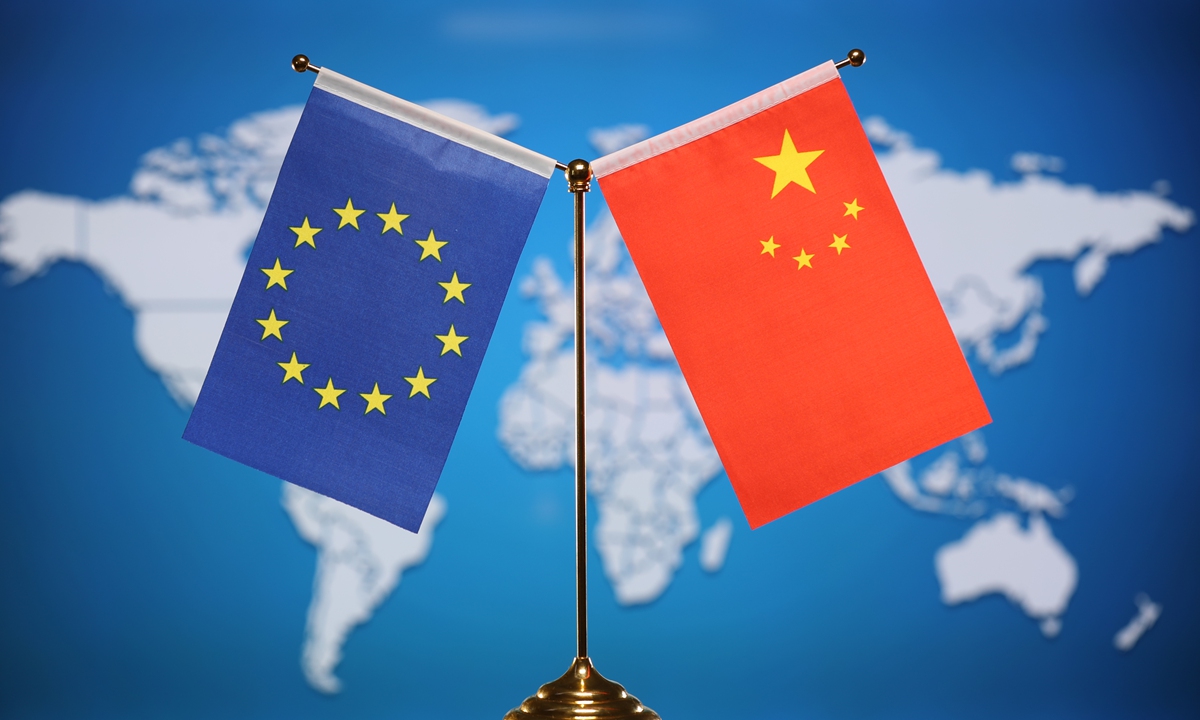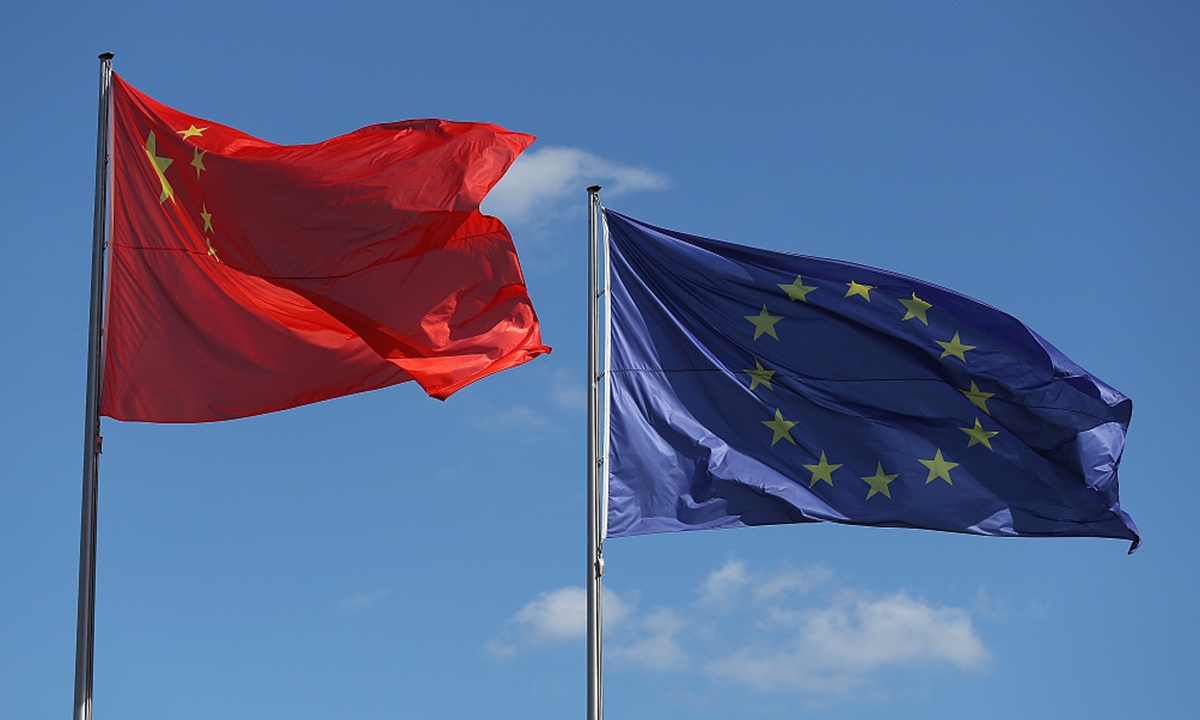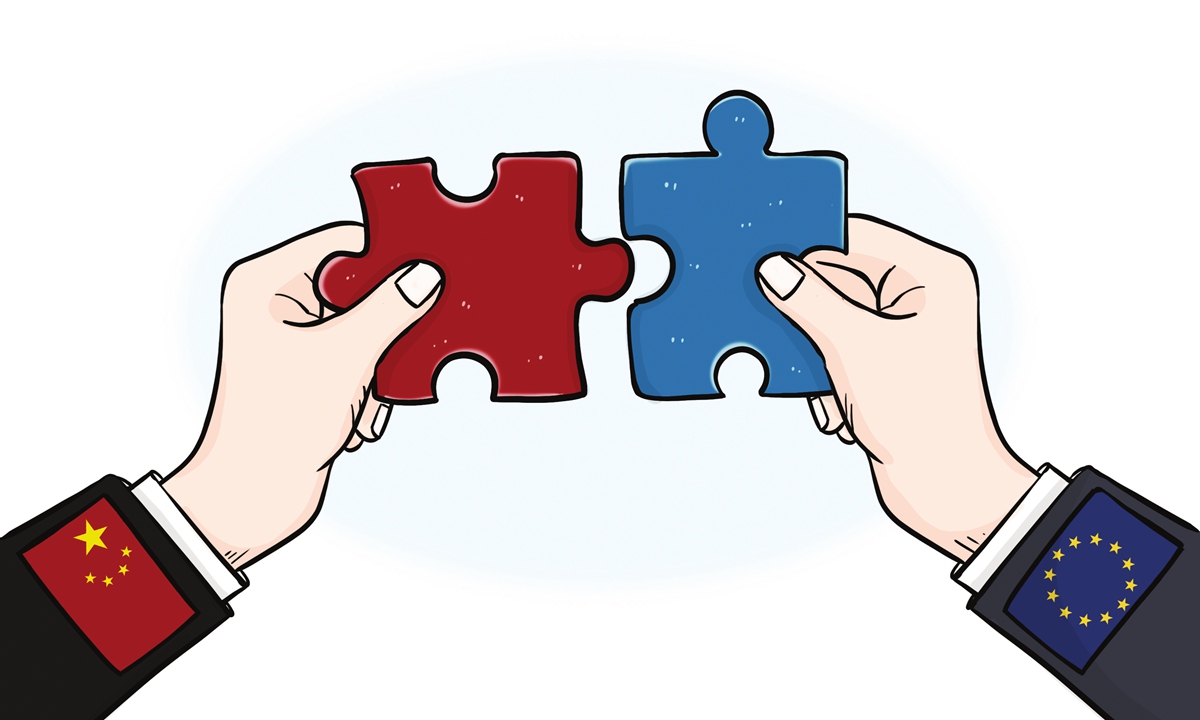China-EU leaders' meetings send positive signal towards world peace, development: Vice FM
Chinese President President Xi meets with European Council President Charles Michel and European Commission President Ursula von der Leyen via video link at the 23rd China-EU leaders' meeting on April 1, 2022. Photo: Xinhua
Observers said that China is offering pragmatic solutions to the EU while encouraging the EU to be diplomatically independent on the Ukraine crisis; and instead of pressuring China to join in sanctioning Russia and being kidnapped by the US, the EU should take control of its own destiny and take action for its security.
President Xi met with European Council President Charles Michel and European Commission President Ursula von der Leyen via video link at the 23rd China-EU leaders' meeting on Friday and exchanged views on bilateral cooperation and the Ukraine crisis.
China finds it deeply regrettable that the situation in Ukraine has come to where it is today. China's position on the Ukraine issue is consistent and clear-cut. China always stands on the side of peace and draws its conclusions independently based on the merits of each matter.
While offering suggestions to help with the Ukraine crisis, Xi said that China supports the EU's efforts toward a political settlement of the Ukraine issue, and has been encouraging peace talks in its own way. China will stay in touch with the EU to prevent a bigger humanitarian crisis.
Xi noted that the root cause of the Ukraine crisis is regional security tensions in Europe that have built over the years. A fundamental solution is to accommodate the legitimate security concerns of all relevant parties. China supports Europe, especially the EU, in playing a primary role, and supports Europe, Russia, the US and NATO in holding dialogue to face up to the tensions that have built up over the years and find solutions for a balanced, effective and sustainable security framework in Europe.
Xi also pointed out that China and the EU need to commit themselves to keeping the situation under control, preventing a spillover of the crisis, and, most importantly, keeping the system, rules and foundation of the world economy stable, to bolster public confidence.
Xi's four proposals on the Ukraine crisis are pragmatic and rational, and take into account the long-term considerations. Since the crisis has already taken place, the key was not to emotionally blame each other but to offer practical solutions, Wang Yiwei, director of the institute of international affairs at the Renmin University of China, told the Global Times.
Xi's proposals highlighted the potential cooperative areas for China and the EU to help ease the situation based on the consensus that both China and the EU called for a ceasefire and peace talks, Wang said.
To prevent a regional conflict from spreading also shows that the West should not just impose sanctions but to cut their losses, Wang said, warning that too many sanctions may result in economic stagnation, inflation and even a debt crisis for Europe.
Hours before the China-EU leaders' meetings on Friday, Chinese analysts warned that China-EU relations cannot be kidnapped by the Ukraine crisis, and Europe should no longer be abducted by the US in foreign policy, as it will greatly undermine the EU's own interests, making it difficult to ensure economic recovery and people's livelihood, and runs counter to Europe's aim of pursuing strategic independence.
Before the talks, several sources from Europe claimed that Brussels is seeking to warn Beijing about supporting Russia in the Ukraine crisis, and some EU officials said any help from China to Russia would "jeopardize" relations with its biggest trade partners - Europe and the US - saying trade between China and the bloc is much higher than that between China and Russia.
The EU should have a clear understanding that standing with the West to sanction Russia does not conform to the principle of China's diplomacy, Cui Hongjian, director of the Department of European Studies at the China Institute of International Studies, told the Global Times on Friday.
"The EU is now kidnapped by the US on security, but that does not conform to the strategic independence the EU has pursued," Cui said, noting that to avoid being caught in hot water again, the EU must take control of its own destiny. And developing ties with China provides the EU an opportunity to develop in a more balanced and comprehensive way in the long run.
It will result in a great negative impact on the EU if it takes trade measures against China. "Especially amid the impact of an energy ban with Russia, damaging trade cooperation with China will make Europe fail to ensure its post-pandemic economic recovery and people's livelihood," Cui said, noting the EU would be "very unwise" to do that.
Expanding cooperation
During the talks on Friday, President Xi also pointed out that the Ukraine crisis has come on top of a protracted COVID-19 pandemic and a faltering global recovery. Against such a backdrop, China and the EU, as two major forces, big markets and great civilizations, should increase communication on their relations and on major issues concerning global peace and development, and play a constructive role in adding stabilizing factors to a turbulent world.
Xi stressed that, since last year, China-EU relations have made new progress despite challenges, and China-EU cooperation has achieved new results despite difficulties. It has been proven that China and the EU share extensive common interests and a solid foundation for cooperation, and that only through cooperation and coordination can the two sides resolve problems and rise to challenges.
President Michel and President von der Leyen said that China is an important force in the world. The EU attaches great importance to China's international standing and role, and to developing relations with China. The EU reaffirmed its commitment to the one-China principle and expressed its desire for candid exchanges with China to sustain the good momentum of EU-China relations. It also expressed readiness to keep deepening cooperation with China
The past year has seen growing challenges in China-EU relations, especially after the China-EU Comprehensive Agreement on Investment was stalled by the unilateral freeze taken by the European Parliament in May. However, economic and trade ties between the two remain strong and continue to expand. In the first two months of 2022, the EU surpassed ASEAN as China's biggest trading partner after losing the spot in 2021, as trade between China and the EU surged 14.8 percent year-on-year at $137.16 billion.
"China and the EU can work together in dealing with some of the impact of the Ukraine crisis or the global economy by establishing pragmatic cooperation mechanisms, which will also benefit China-EU relations," Cui said.
On the Ukraine crisis, China and the EU, as two major powers, could strengthen cooperation on promoting peace talks between Russia and Ukraine, and between Russia and the US, and provide humanitarian assistance to Ukraine as well as explore economic cooperation to achieve a stable world economy, analysts said.
Xi's speech highlighted that China and the EU should act as two major forces, and offset uncertainties in the international landscape with the stability of China-EU relations, Wang said.
Wang stressed that stable China-EU relations meant that their relations cannot be abducted by the Ukraine crisis, human rights issues or by some countries like Lithuania.
Related Articles:
China, EU share consensus, to jointly face global crisis as two major stabilizing forces: FM China and the EU have much in common in basic positions. Both sides support peace talks, and efforts to ease tensions and to prevent large scale humanitarian crisis. NeitChina, EU should seek further cooperation, strengthen policy coordination: Premier Li
China called for cooperation with the EU as Chinese Premier Li Keqiang stressed on Friday that the two sides should seek "new highlights" in their relationship and strengthen "policy coordination" in major areas.



































